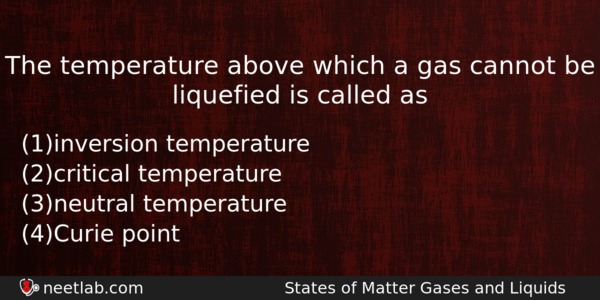| ⇦ | 
| ⇨ |
The temperature above which a gas cannot be liquefied is called as
Options
(a) inversion temperature
(b) critical temperature
(c) neutral temperature
(d) Curie point
Correct Answer:
critical temperature
Explanation:
Critical temperature (Tc) of a gas is defined as temperature above which it cannot be liquefied irrespective of pressure applied.
Critical pressure (Pc) of the gas is the pressure required by the gas at the Tc. Critical volume, (Vc) is the volume occupied by one mole of a gas at its Tc and Pc.
Related Questions: - If 30 mL of H₂ and 20 mL of O₂ reacts to form water. what is left at the end
- In an equilibrium reaction, if temperature increases
- Crystalline solids are
- Which of the following equations describe the first law of thermodynamics
- Non – lanthanide element is
Topics: States of Matter Gases and Liquids
(80)
Subject: Chemistry
(2512)
Important MCQs Based on Medical Entrance Examinations To Improve Your NEET Score
- If 30 mL of H₂ and 20 mL of O₂ reacts to form water. what is left at the end
- In an equilibrium reaction, if temperature increases
- Crystalline solids are
- Which of the following equations describe the first law of thermodynamics
- Non – lanthanide element is
Topics: States of Matter Gases and Liquids (80)
Subject: Chemistry (2512)
Important MCQs Based on Medical Entrance Examinations To Improve Your NEET Score
18000+ students are using NEETLab to improve their score. What about you?
Solve Previous Year MCQs, Mock Tests, Topicwise Practice Tests, Identify Weak Topics, Formula Flash cards and much more is available in NEETLab Android App to improve your NEET score.
Share this page with your friends

Leave a Reply